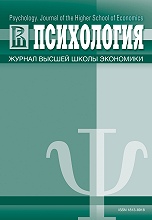Optimistic Attributional Style and Dispositional Optimism: Empirical Study of Similarities and Differences between Two Conctructs
Abstract
The paper discusses the problem of differentiating two types of optimism, which reflect different sides of constructive thinking, dispositional optimism (DO, generalized positive or negative expectations about the future) and optimistic attributional style (OAS, explanatory style applied to positive and negative life situations). Despite a multitude of studies focused on each of these constructs, past work didn't focus on the joint contribution of DO and OAS to activity performance and psychological well-being. In a study with university students (N=141) we found common and specific features of these two constructs as predictors of well-being and academic achievement. Attributional style was measured using the brief Success and Failure Explanatory Style Questionnaire (Gordeeva, Osin, Shevyakhova, 2009) and dispositional optimism was assessed by means of Dispositional Optimism Test (Gordeeva, Sychev, Osin, 2010). These two constructs were related and similarly predicted psychological well-being. We tested a path model, where the effect of OAS for success and failures on academic achievement and well-being was mediated by effective self-regulation, whereas dispositional optimism was directly related to well-being. The model (tested by Mplus 7.4) showed a good fit to the data (χ2 = 9,315; df = 7; p = 0,23; CFI = 0,975; NNFI = 0,957; RMSEA = 0,048). Only the OAS was associated to academic achievement and its associations with the performance and well-being outcomes were mediated by self-regulation and self-organization (skills of goal-setting, planning, and persistence).
Downloads
References
2. Carver, C. S., Scheier, M. F., & Segerstrom, S. C. (2010). Optimism. Clinical Psychology Review, 30(7), 879-889. https://doi.org/10.1016/j.cpr.2010.01.006
3. Gordeeva, T. O., & Osin, E. N. (2010). Positive thinking as a factor of academic achievement. Voprosy Psikhologii, 1, 24-33. (in Russian)
4. Gordeeva, T. O., & Osin, E. N. (2011). Optimistic Attributional Style as a Predictor of Well-Being and Performance in Different Academic Settings. In I. Brdar (Ed.), The Human Pursuit of Well-Being (pp. 159-174). Springer Netherlands. https://doi.org/10.1007/978-94-007-1375-8_14
5. Gordeeva, T. O., Osin, E. N., & Shevyakhova, V. Yu. (2009). Diagnostika optimizma kak stilya ob”yasneniya uspekhov i neudach: oprosnik STOUN[Diagnostics of the optimism as an attributional style of explaining of successes and failures]. Moscow: Smysl.
6. Gordeeva, T. O., Sychev, O. A., & Osin, E. N. (2010). Razrabotka russkoyazychnoi versii testa dispozitsionnogo optimizma (LOT) [The development of a Russian version of the test of dispositional optimism (LOT)]. Psychologicheskaya Diagnostika, 2, 36-64.
7. Houston, D. M. (2016). Revisiting the relationship between attributional style and academic performance. Journal of Applied Social Psychology, 46(3), 192-200. https://doi.org/10.1111/jasp.12356
8. Hu, T., Zhang, D., & Yang, Z. (2015). The relationship between attributional style for negative outcomes and depression: A meta-analysis. Journal of Social and Clinical Psychology, 34(4), 304-321. https://doi.org/10.1521/jscp.2015.34.4.304
9. Mandrikova, E. Yu. (2010). Razrabotka oprosnika samoorganizatsii deyatel’nosti (OSD) [Elaboration of activity’s self-organization questionnaire]. Psychologicheskaya Diagnostika, 2, 87-111.
10. Osin, E. N., & Leontiev, D. A. (2008). Aprobaciya russkoyazychnykh versii dvukh shkal ekspress-ocenki subyektivnogo blagopoluchiya[Russian-language validation of two brief subjective well-being scales]. InMaterialy III Vserossiiskogo Sociologicheskogo Kongressa[Proceedings of the 3rd Russian Congress on Sociology]. Moscow: Institute of Sociology of the Russian Academy of Sciences/Russian Society of Sociologists. Retrieved from http://publications.hse.ru/en/chapters/78753840
11. Peterson, C., & Barrett, L. C. (1987). Explanatory style and academic performance among university freshman. Journal of Personality and Social Psychology, 53(3), 603-607. https://doi.org/10.1037/0022-3514.53.3.603
12. Peterson, C., & Seligman, M. E. (1984). Causal explanations as a risk factor for depression: Theory and evidence. Psychological Review, 91(3), 347-374. https://doi.org/10.1037/0033-295X.91.3.347
13. Richardson, M., Abraham, C., & Bond, R. (2012). Psychological correlates of university students’ academic performance: A systematic review and meta-analysis. Psychological Bulletin, 138(2), 353-387. https://doi.org/10.1037/a0026838
14. Sweeney, P. D., Anderson, K., & Bailey, S. (1986). Attributional style in depression: a meta-analytic review. Journal of Personality and Social Psychology, 50(5), 974-991. https://doi.org/10.1037/0022-3514.50.5.974





